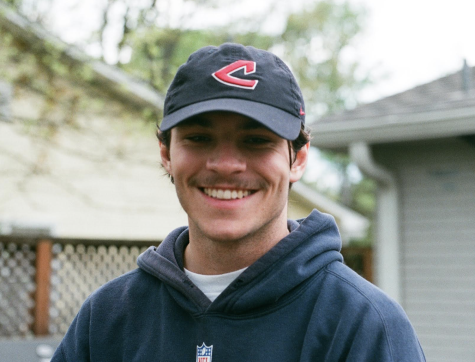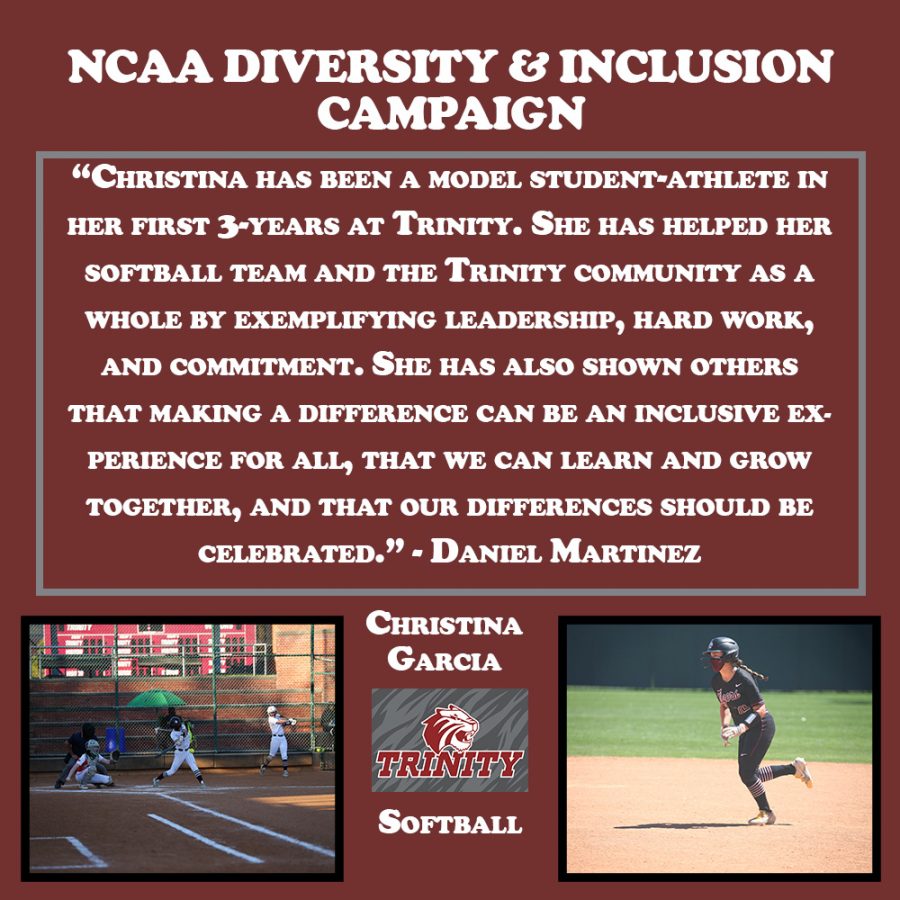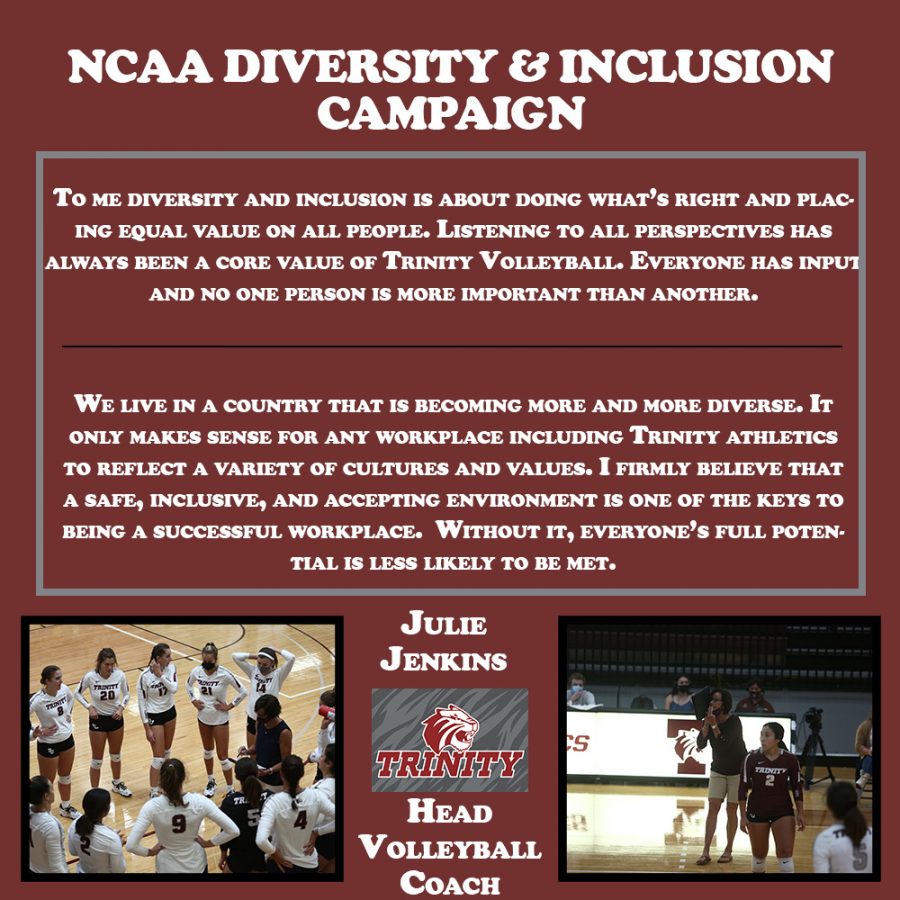A seat at the table, a place on the bench
Trinity Athletics participated in NCAA social media campaign to promote diversity and inclusion
From Tuesday, Oct. 19 through Thursday, Oct. 21, the National Collegiate Athletic Association (NCAA) promoted a Diversity and Inclusion social media campaign, one in which Trinity University took the opportunity to promote student-athletes and coaches that make up a diverse and inclusive athletic community.
Based on the NCAA’s website, the campaign was “meant to be a week of awareness, education and engagement showing the importance of inclusive environments in college sports.” Each day, the campaign featured a different theme including “My Voice, My Platform,” “Championing Change,” and “Belonging Is…”.
Each day of the campaign, Trinity Athletics took to their Instagram and Twitter accounts where they posted graphics related to these themes. These graphics shared quotes from players and coaches which answered questions and prompts from the NCAA on each topic.
The day-one theme of “My Voice, My Platform” had the goal of “exploring student-athletes ‘ identities, perspectives, and experiences.” The NCAA wished for athletes to be able to display who they are and how they have been impactful within their respective communities.
Samantha Henry, a senior on the women’s basketball team was one of two athletes that the spotlight was shown on during the first day.
Her teammate, senior Hailey Coleman, praised Henry for her involvement on campus.
“Sam’s involvement with Trinity’s [Black Student Union] and [African Student Association] organizations, her Alpha Kappa Alpha sorority, campus research and basketball is a perfect example of the full student-athlete experience,” Coleman said.
Also celebrated on day one of the campaigns was Christina Garcia, a junior and member of the university softball team.
Trinity strength and conditioning coach Daniel Martinez spoke to the impact that Garcia has had in her time on campus thus far.
“She has helped her softball team and the Trinity community as a whole by exemplifying leadership, hard work and commitment. She has also shown others that making a difference can be an inclusive experience for all, that we can learn and grow together and that our differences should be celebrated,” Martinez said.
The day two concept of “Championing Change” had the broad goal of “outlining personal and institutional action steps for inclusive excellence.” The day intended to “showcase the strengths of their respective campus or conference community, with a particular focus on how diversity and inclusion enrich these communities.”
On day two, volleyball coach Julie Jenkins shared her thoughts on what diversity and inclusion mean to her.
“To me, diversity and inclusion are about doing what’s right and placing equal value on all people. Listening to all perspectives has always been a core value of Trinity Volleyball. Everyone has input and no one person is more important than another,” Jenkins said.
Coleman, a member of the Student-Athlete Advisory Committee, Voter Advocacy & Census Engagement Task force and the Black Student Union, also got the opportunity to speak on diversity and inclusion more broadly.
“By continuing to host honest conversations and challenging how we think about [diversity, equity and inclusion], we will promote intentional action to champion diversity and inclusion within our Trinity community,” Coleman said.
The last day of the campaign carried the idea “Belonging Is…”, a day which aimed to “[define] belonging to support fostering communities of belonging within athletics.” The NCAA hoped that student-athletes would share the ideas and concepts that made them feel that they themselves belonged in the place they are and also the steps that they take to make others feel accepted themselves.
On the final day, senior volleyball player Emily Ellis and first-year track & field athlete Sealan Ledat both shared moments in which they felt a sense of belonging in their college experiences. Ellis reflected on her experience in the program during her sophomore year.
“The whole team was actively trying to make everyone feel important and like we were meant to be there. It was a great experience and made us all feel like we belonged,” Ellis said.
However, for Ledat, the experience of belonging on campus came from outside athletics.
“Coming back to campus and seeing familiar faces was such a welcome experience, but when I went to a Trinity Mutual Aid meeting and met a more diverse group of people outside of my team is when I really started feeling like I belong here. There were people I knew in multiple sports, multiple degrees and just vastly different walks of life, and I managed to feel some sense of kinship with all of them,” Ledat said.
While the campaign itself only lasted three days, the NCAA provided suggestions for ways universities could implement similar themes at other times of the year to promote the same ideas of diversity and inclusion, including holding training sessions for student-athletes and athletics staff, designating home events to support and emphasize the concepts and creating communities for underrepresented student-athletes from marginalized groups.

Having grown up in San Antonio, sports have always been especially meaningful to me, in the opportunities that I had playing but also in the way teams...





